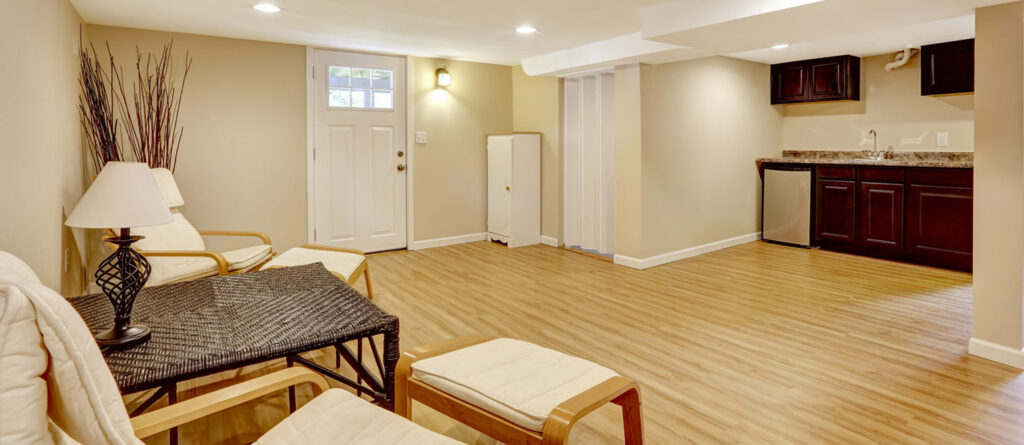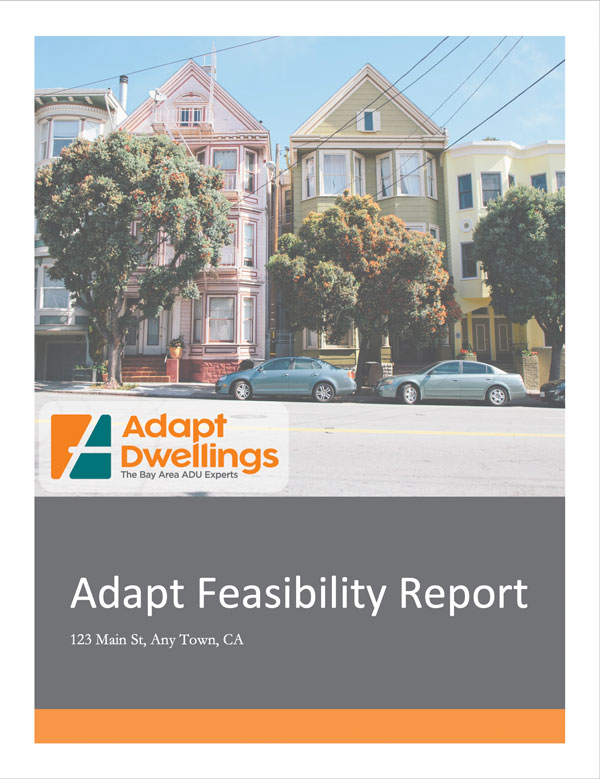Legalized Unit
Legalizing a unit is a smart move, especially if you plan on using it as a rental. Many property owners have purchased or inherited property with unpermitted units, or perhaps have added units without permits themselves.

This illegal unit has a ceiling height lower than code requirements.
What is an Illegal Unit?
In order for a dwelling unit to be considered legal, it must have been built with the appropriate permits and obtain a certificate of occupancy from your local jurisdiction. Adapt Dwellings is an expert in legalizing units. Our experience in building codes, permitting, and accessory dwelling units gives us a unique advantage in helping owners of illegal units take the best path toward legalization.
Our Process
Get a full review
The first step is to assess the feasibility of legalizing your unit. We start all customers off with an study that includes an on-site inspection and thorough building records research to help determine what steps need to be taken to legalize your unit. Units built without proper permits were often done so for a reason. Sometimes this is to cut costs—either on permit fees or by not using a licensed contractor—and other times because there were known issues with the space that did not meet building codes. In the case of unpermitted ADUs, it could just be that zoning regulations at the time did not allow for ADUs like they do today, but even so, there are still likely to be issues with bringing such units up to code.
Design your unit
Once we’ve completed an assessment of your property, you will have a better understanding of how much work it will take to legalize your unit and what your options are. Our detailed inspection report will take most of the guesswork out of the process for you and greatly speed up the process by summarizing your options and calling your attention to the specific design and construction considerations.
Get city approval
Depending on the property, location, and unit in question, the best path toward legalization may be to:
- Apply through your local jurisdiction’s ADU program
- Apply through your local jurisdiction’s unit legalization program
- Return the space to a condition in which it can be properly permitted as something besides a separate dwelling unit
Whichever option you choose, our architect will design a set of current and proposed plans to get approval from your local jurisdiction to move forward.
Construction & approvals
Once plans are approved, you can pull the correct permits and begin making the required alterations. During this phase, a local building inspector will make various trips to your property to sign off on progress. This is the step where many property owners get nervous. Will inspectors request to see work that has already been completed, such as plumbing and electrical? You should be prepared for such a possibility. Part of legalizing a unit is to make sure the unit is safe for habitation. Building codes exist for a reason and you should never cut corners. Our Adapt Feasibility study will assess the condition of your unit to better prepare you for the amount of construction that may be needed to legalize your unit. We believe in producing a thorough feasibility study before we start any ADU project because it clarifies the challenges, projected costs and increase in value of your investment.
Our Process
Get a full review
The first step is to assess the feasibility of legalizing your unit. We start all customers off with an study that includes an on-site inspection and thorough building records research to help determine what steps need to be taken to legalize your unit. Units built without proper permits were often done so for a reason. Sometimes this is to cut costs—either on permit fees or by not using a licensed contractor—and other times because there were known issues with the space that did not meet building codes. In the case of unpermitted ADUs, it could just be that zoning regulations at the time did not allow for ADUs like they do today, but even so, there are still likely to be issues with bringing such units up to code.
Design your unit
Once we’ve completed an assessment of your property, you will have a better understanding of how much work it will take to legalize your unit and what your options are. Our detailed inspection report will take most of the guesswork out of the process for you and greatly speed up the process by summarizing your options and calling your attention to the specific design and construction considerations.
Get city approval
Depending on the property, location, and unit in question, the best path toward legalization may be to:
- Apply through your local jurisdiction’s ADU program
- Apply through your local jurisdiction’s unit legalization program
- Return the space to a condition in which it can be properly permitted as something besides a separate dwelling unit
Whichever option you choose, our architect will design a set of current and proposed plans to get approval from your local jurisdiction to move forward.
Construction & approvals
Once plans are approved, you can pull the correct permits and begin making the required alterations. During this phase, a local building inspector will make various trips to your property to sign off on progress. This is the step where many property owners get nervous. Will inspectors request to see work that has already been completed, such as plumbing and electrical? You should be prepared for such a possibility. Part of legalizing a unit is to make sure the unit is safe for habitation. Building codes exist for a reason and you should never cut corners. Our Adapt Feasibility study will assess the condition of your unit to better prepare you for the amount of construction that may be needed to legalize your unit. We believe in producing a thorough feasibility study before we start any ADU project because it clarifies the challenges, projected costs and increase in value of your investment.

